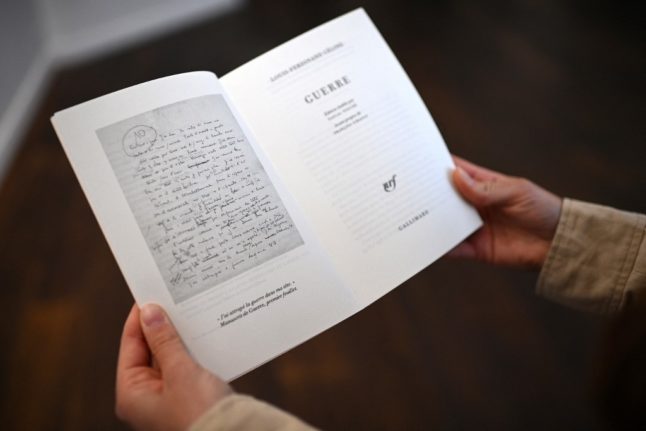The Swedish Academy stunned the world last year when it awarded the Nobel Literature Prize to US counter-culture icon and rock star Bob Dylan. This year, experts say, the laureate will be more conventional.
Weeks of speculation and buzz about the Academy's pick for 2017 will come to an end on Thursday at 1pm Stockholm time, when its permanent secretary Sara Danius announces this year's winner.
Not only are the Academy members expected to go with a more orthodox choice, predictions are that they will also honour someone who enjoys broad consensus and is seen as Nobel-worth, with the institution keen to avoid the media spectacle surrounding Dylan's win.
The first singer-songwriter to win the prestigious prize, the rock legend didn't comment on his Nobel for several weeks and then snubbed the formal prize ceremony in Stockholm.
“The Academy is actually a very discreet society and we shouldn't expect anything sensational” this year, Clemens Poellinger, literary critic for Swedish daily Svenska Dagbladet, told AFP.
READ ALSO: Follow The Local's 2017 Nobel coverage here
So who will get the nod?
The Academy is known for its cloak-and-dagger methods to prevent any leaks, resorting to code names for authors and fake book covers when reading in public.
Pundits therefore try to dissect the Academy's latest interests to guess the winner, while punters have a field day on betting sites.
On Wednesday, novelists Haruki Murakami of Japan and Ngugi wa Thiong'o of Kenya had the lowest odds on numerous sites. They were followed by Canada's Margaret Atwood, whose novel 'The Handmaid's Tale' was recently made into a well-received TV series, and Israel's Amos Oz.
Yet another man?
Will the prize go to yet another man? Of the 113 laureates honoured since the prize was first awarded to France's Sully Prudhomme in 1901, only 14 are women.
But the Academy insists it doesn't take gender into consideration, nor nationality, language or genre for that matter.
“The gender balance among those who have received the prize is embarrassing” and the Swedish Academy must be aware of it, said Rakel Chukri, the cultural editor of regional daily Sydsvenskan.
If the Academy were to go with a political pick, it could choose Syrian-born and secular poet Adonis, a stark critic of dictatorship who blends classical and modern styles.
Meanwhile, two Icelandic writers are also making buzz: Sjon, the pen name of poet Sigurjon Birgir Sigurdsson, and Jon Kalman Stefansson.
Halldor Laxness was the only Icelandic author to win the Nobel, in 1955.
Behind-the-scenes pressure
Each February, the Academy makes a list of all the nominations it has received by those eligible to do so – including former laureates and university professors – before reducing it to five names in May.
The members then spend the summer reading those writers, before making their choice in October.
Behind the scenes, intense lobbying campaigns are mounted to influence the Academy, though its members insist they are immune to such efforts.
The lobbying can even backfire against the writers.
Kjell Espmark, an Academy member for more than 30 years, told daily Dagens Nyheter that the institution was regularly courted by regimes, especially in countries that have industrialized rapidly.
“They want an atomic bomb and a laureate,” he said.
He recounted how during a visit to Portugal in the 1990s, he was approached by then president Mario Soares.
“He walked up with Jose Saramago and said 'You give the prize to this guy'. Saramago was so embarrassed he wanted to disappear,” Espmark recalled.
The Academy, which had already been mulling Saramago for the prize, found itself in a tricky situation, he said: Should they turn their backs on Saramago, or ignore Soares' blunt move?
They ultimately honoured Saramago in 1998. He remains the only Portuguese-language writer to win the Nobel, though Antonio Lobo Antunes' name regularly appears in the speculation.
“This year I think it's going to be either Antonio Lobo Antunes or Ismail Kadare from Albania. Both of them are writers who have been tipped for the Nobel for a long time, and both of them are names that when they are read out, everyone will think 'Ah, of course they deserve the prize', and there'll be no objection,” said Dagens Nyheter's culture editor Björn Wiman.
At the Hedengrens bookstore in central Stockholm, owner Nicklas Björkholm has set up a wall with books by possible winners, including Spain's Javier Marias, Americans Joan Didion and Don DeLillo, Poland's Olga Tokarczuk and David Grossmann of Israel.
His personal favourite for the prize is Korean poet Ko Un because, he insists, “the time has come for a non-anglophone and an Asian”.
Article by the AFP's Helene Dauschy



 Please whitelist us to continue reading.
Please whitelist us to continue reading.